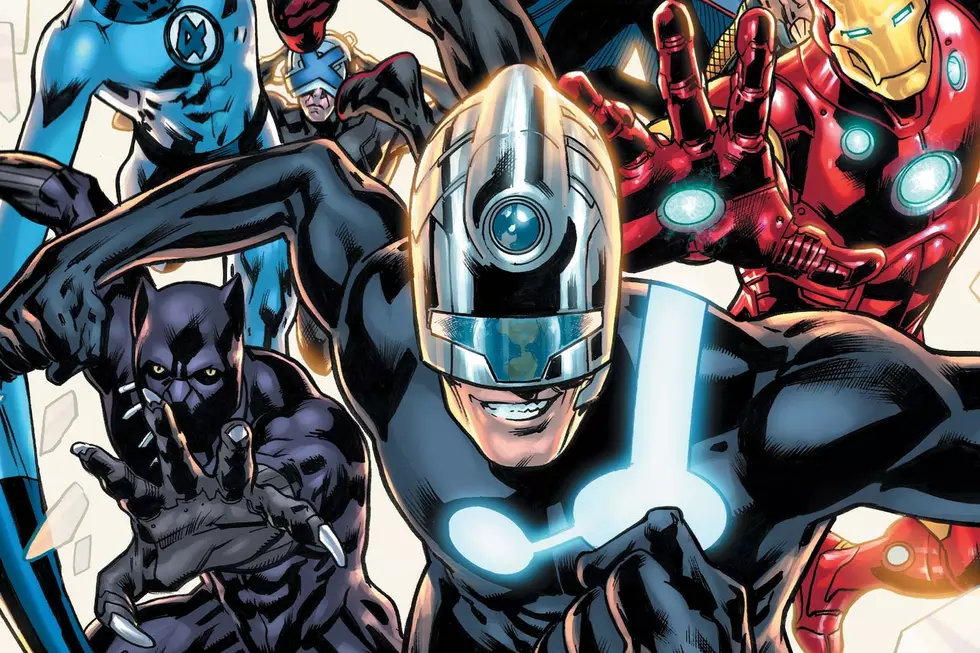
‘Annihilation’ Review: Alex Garland Just Made One of the Best Sci-Fi Movies in Years
Sometimes we call blockbusters “popcorn movies.” Annihilation suggests the need for a term to describe the opposite sort of film. It demands absolute attention even as it dares you to look away from some of the most nightmarish images to appear on movie screens in years. It is beautiful at times, provocative at others, and downright nauseating in between. When people say a horror movie “made their skin crawl,” they don’t usually mean it literally. In this case, I do: This movie made me physically uncomfortable in my own skin. It’s one hell of a don’t-get-popcorn movie.
It’s based on the first in a trilogy of novels by Jeff VanderMeer which I have not read but which, according to a Wikipedia (which is never wrong), is significantly different from this adaptation by fearless writer/director Alex Garland. His version primarily concerns Lena (Natalie Portman), a Johns Hopkins biology professor whose soldier husband Kane (Oscar Isaac) never returned from a mysterious mission. A year after his disappearance, he suddenly shows up at her door, but something about him seems off. Their reunion is strained. And then Kane begins coughing up blood.
Eventually the couple is taken to Area X, the mysterious territory where Kane vanished, and Lena volunteers to join Dr. Ventress (Jennifer Jason Leigh), Josie (Tessa Thompson), Anya (GIna Rodriguez), and Sheppard (Tuva Novotny) on the next, all-female expedition into what’s called “The Shimmer,” a permeable band of otherworldly light surrounding a lighthouse somewhere deep in Area X. Lena wants to figure out what happened to Kane and possibly cure him.
From what I gather, Garland’s Annihilation is a little more concrete about the origins of the Shimmer and Area X than VanderMeer’s novel, but the film is still filled with mysteries about this place and its mutated inhabitants and, on an more fundamental level, about the symbiotic relationship between life and death. It makes a fascinating companion piece with Garland’s last film, Ex Machina, a smaller-scale science-fiction picture about a genius roboticist (also played by Isaac) who creates a cutting-edge AI and performs a Turing test on it. Both movies are about the nature of humanity, our desire to play god, and societies precariously perched on the tipping point between order and chaos. They also feature characters whose appearances cannot be trusted, moments of graphic and extreme violence, and repeated claustrophobic scenes of women imprisoned and interrogated by looming, ominous men. Garland is clearly a filmmaker with stuff on his mind.
But Annihilation isn’t just some cold, sterile journey into the inner recesses of one dude’s neuroses. It’s also one of the most disturbing movies I have seen in a long time. It has a couple traditional jump scares, but what makes it so unsettling is that it lingers on its unearthly visuals — animal and plant life (or some creatures that seem to intermingle the two) that should not exist — and lets us reckon with them. So many science-fiction movies rehash the same exhausted monster and alien designs and plot threads. Annihilation is something new and different. And as the explorers of Area X find, things that are new and different can be exhilarating or absolutely terrifying.
It’s easy to imagine Paramount studio executives feeling the same way when they first laid eyes on what Garland had made. Ultimately, they decided to hedge their financial bets by selling some of the rights to the movie to Netflix. Anyone who watches the film will immediately understand why. It is tough, bleak, brutally intense, and genuinely scary - not in the cutesy cathartic way of most horror films, but in a way that makes you ponder the nature of existence and leaves you with a pit in your stomach.
And that’s before an ending that will have you puzzling over its meaning and dazzled by Garland’s chutzpah. The slightly psychedelic qualities of Area X (and the overtly psychedelic qualities of the closing credits) call to mind the end of Stanley Kubrick’s 2001: A Space Odyssey, another sci-fi movie that attempts to reckon with life forms so far beyond our plane of existence they are difficult to understand and even harder to describe in language. Both movies share their protagonists’ spirit of exploration and a refusal to spoon-feed viewers simplistic explanations for their surreal images.
2001 was as divisive in its day as Annihilation is sure to be in ours. I can’t say for certain that future generations will someday look back at Annihilation with the same sort of reverence with which we look back at 2001. But it wouldn’t surprise me at all if they did. I know this much right now: I barely slept last night and this amazing, haunting movie is to blame.
Gallery - The Greatest Sci-Fi Movie Posters in History
More From ScreenCrush









